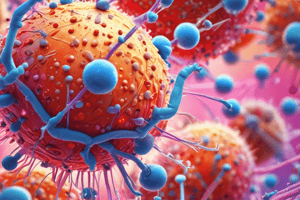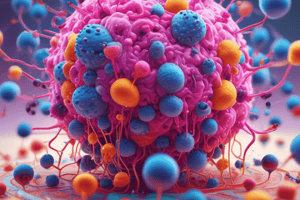Podcast
Questions and Answers
What is the main purpose of antibodies in antibody-mediated immunity (AMI)?
What is the main purpose of antibodies in antibody-mediated immunity (AMI)?
- To neutralize and eliminate foreign proteins (correct)
- To stimulate cell-mediated immunity
- To directly kill infected cells
- To enhance tissue repair
What factor significantly increases the risk of infection and cancer development in older adults?
What factor significantly increases the risk of infection and cancer development in older adults?
- Higher frequency of vaccinations
- Enhanced antibody production
- Increased physical activity
- Declining immune function (correct)
Why must patients receiving organ transplants take immunosuppressive drugs?
Why must patients receiving organ transplants take immunosuppressive drugs?
- To avoid transplant rejection (correct)
- To increase the growth of the transplanted organ
- To prevent infection from other patients
- To enhance their immune response
Which statement is true regarding the transfer of antibody-mediated immunity (AMI)?
Which statement is true regarding the transfer of antibody-mediated immunity (AMI)?
What is a possible consequence of chronic inflammation?
What is a possible consequence of chronic inflammation?
What is the process by which a mother passes antibodies to her fetus?
What is the process by which a mother passes antibodies to her fetus?
Which immune response is primarily mediated by B-cells?
Which immune response is primarily mediated by B-cells?
What type of immunity involves a vaccination?
What type of immunity involves a vaccination?
Which component is NOT part of the cell-mediated immunity response?
Which component is NOT part of the cell-mediated immunity response?
What determines self-tolerance in white blood cells?
What determines self-tolerance in white blood cells?
What is the primary distinction between inflammation and infection?
What is the primary distinction between inflammation and infection?
Which organ is primarily involved in the development of T-cells?
Which organ is primarily involved in the development of T-cells?
Which type of immunity is achieved through a specific transfusion such as immunoglobulins?
Which type of immunity is achieved through a specific transfusion such as immunoglobulins?
Flashcards are hidden until you start studying
Study Notes
Types of Immunity
- Natural active immunity develops when an antigen enters the body, prompting the immune system to produce specific antibodies.
- Natural passive immunity involves the transfer of antibodies from mother to fetus via the placenta, or through colostrum in breast milk.
- Artificial active immunity is achieved through vaccination, introducing antigens to stimulate antibody production.
- Artificial passive immunity occurs through transfusion of immunoglobulins for immediate antibody supply.
Immune System Functionality
- The immune response integrates multiple organs and cells, including B-cells, T-lymphocytes, macrophages, and spleen.
- Antibody-mediated immunity (humoral immunity) relies on the interaction of antigens and antibodies for neutralizing foreign invaders.
- Cell-mediated immunity mobilizes white blood cells (WBCs), T-cells, natural killer (NK) cells, and cytokines for direct combat against pathogens.
- Thymus and lymph nodes are integral to regulating immune responses.
White Blood Cells (WBCs) and Immunity
- WBCs facilitate inflammation and immune reactions, acting as the primary defenders against infections.
- The differential white blood cell count helps assess infection risk, allergic reactions, and differentiates between bacterial and viral infections.
- WBCs utilize self-tolerance to differentiate healthy self-cells from non-self-cells, employing proteins like human leukocyte antigens (HLAs) for identification.
Inflammation vs. Infection
- Inflammation and infection are distinct; inflammation can occur without infection, but infections typically provoke inflammation.
- Localized inflammation is beneficial, aiding recovery, while chronic inflammation can lead to tissue damage.
- Inflammation is non-transferable between individuals.
Antibody-mediated Immunity (AMI)
- AMI neutralizes and eliminates foreign proteins through antigen-antibody interactions.
- Sensitized B-cells are responsible for producing antibodies.
- AMI can be shared between individuals for temporary immunity.
Aging and Immunity
- Immune function is optimal between ages 20 and 40; older adults face higher risks of infection and cancer.
- Immunosuppressive drug users are particularly vulnerable to infections and cancer.
- Transplant rejection is a typical immune reaction requiring daily immunosuppressants for organ transplant recipients.
Studying That Suits You
Use AI to generate personalized quizzes and flashcards to suit your learning preferences.




